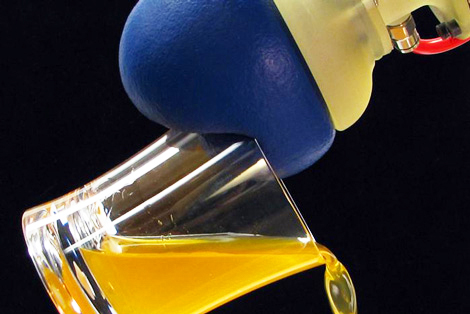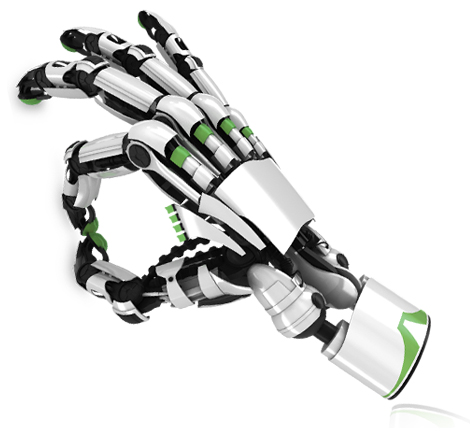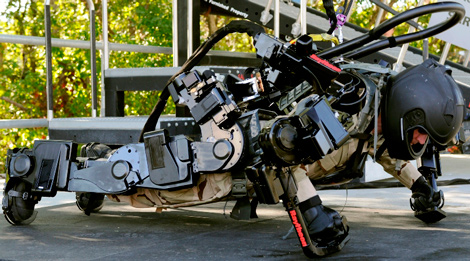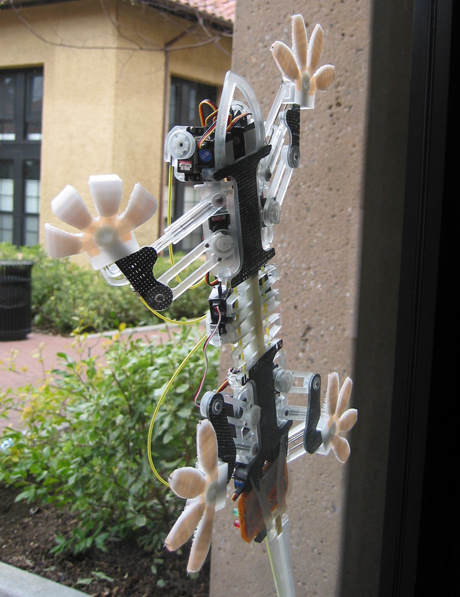Posted on November 7th, 2010 by jxh

Just because humans have fingers doesn’t mean that robots need to have them too.
Researchers have developed a new type of robotic hand – a soft gripping mechanism that stiffens when air is sucked out.
The hand is essentially a latex balloon filled with ground coffee (because the grounds are both lightweight and pliable). Its softness allows the robot hand to conform to the shape of hard objects.
Read More
Filed under: Computer, e-News, Mechanical | 5 Comments »
Tags: Computer, Computer Science, Mechanical, Robotics
Posted on October 21st, 2010 by axb
 One of the most fascinating aspects of engineering is the creative technological innovations it produces. While plenty of sci-fi television features outlandish gadgets and science experiments, only a few programs showcase real upcoming inventions being made by actual engineers and scientists. That’s why we’re particularly excited about this new show:
One of the most fascinating aspects of engineering is the creative technological innovations it produces. While plenty of sci-fi television features outlandish gadgets and science experiments, only a few programs showcase real upcoming inventions being made by actual engineers and scientists. That’s why we’re particularly excited about this new show:
Dean of Invention, on the Planet Green network, follows famous inventor Dean Kamen on a quest to find the most cutting-edge technology on the planet and the most amazing and inventive engineering solutions to modern-day challenges.
Read More
Filed under: Biomedical, Computer, e-News, Electrical, Environmental, Explore Engineering, Mechanical, Transportation | 1 Comment »
Tags: Biomedical, Computer, Electrical, Environmental, Mechanical, Robotics, Transportation
Posted on September 30th, 2010 by jxh

Imagine hefting 200 pounds as though it were a mere 12. Raytheon Company has just released a full-body suit that could make the Iron Man fantasy become a reality.
Called the XOS-2 Exoskeleton, it essentially grants the wearer superhuman strength (and also looks really awesome). The new suit has made significant improvements over its predecessor, the XOS-1, which was first demonstrated two and a half years ago.
Read More
Filed under: e-News, Electrical, Mechanical | 4 Comments »
Tags: Electrical, Mechanical, Robotics
Posted on September 22nd, 2010 by axb

Human skin is extraordinarily sensitive – our fingertips can perceive extremely small differences in pressure, texture, and temperature. Mimicking this ability artificially is a real technological challenge, but fortunately electrical engineers at Stanford and UC Berkeley seem to be up to the task.
At Stanford, a team led by chemical engineering professor Zhenan Bao has developed an artificial skin that is reportedly over 1,000 times more sensitive than its human counterpart. It consists of a thin rubber material placed between two parallel electrodes. When an object touches the skin and compresses the rubber, the surrounding electrodes register this pressure and convert it to electrical signals.
Read More
Filed under: Biomedical, Chemical, e-News, Electrical, Materials | Comments Off on Engineering Artificial Skin
Tags: Biomedical, Chemical, Electrical, Materials, Nanotechnology, Robotics
Posted on August 31st, 2010 by jxh

Has life got you climbing up the walls? Well, soon you may be able to do it for real – and as well as a gecko.
Geckos are able to stick to walls thanks to a technique called dry adhesion. Each toe of a gecko’s foot contains hundreds of flap-like ridges, and each ridge has millions of hairs.
The tiny hairs are 10 times thinner than a human’s and each one divides into even smaller strands called spatulae. These split ends interact with the molecules of the climbing surface using the van der Waals force, and stick to it when pulled in one direction. If pulled in a different direction, however, the adhesive comes right off.
Now, Stanford University mechanical engineers have created a robot that will replicate a gecko’s sticky foot in order to climb walls.
Read More
Filed under: e-News, Mechanical | Comments Off on Stickybot to the Rescue
Tags: Biomimicry, Mechanical, Robotics










 One of the most fascinating aspects of engineering is the creative technological innovations it produces. While plenty of sci-fi television features outlandish gadgets and science experiments, only a few programs showcase real upcoming inventions being made by actual engineers and scientists. That’s why we’re particularly excited about this new show:
One of the most fascinating aspects of engineering is the creative technological innovations it produces. While plenty of sci-fi television features outlandish gadgets and science experiments, only a few programs showcase real upcoming inventions being made by actual engineers and scientists. That’s why we’re particularly excited about this new show:

